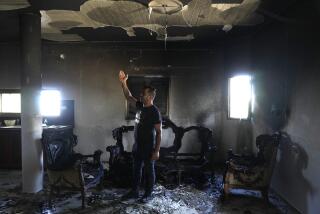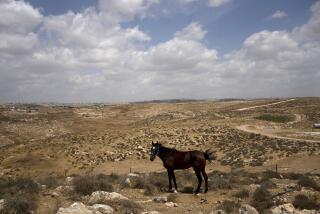Israeli Army Pulls Up Settler Outposts’ Stakes
AMONA, West Bank -- The rusty old guard tower didn’t get much use. Some people here said they climbed up there to watch for Palestinian attackers. Others said it was just a kids’ hangout. But mostly, it was a place-marker, a toehold on rocky West Bank land to which Jewish settlers hoped to lay permanent claim.
Israeli army troops on Monday night and early Tuesday dismantled the tower near Amona and 9 other unauthorized settlement outposts -- mobile homes and other small structures clinging to craggy hilltops. Though the targeted outposts were uninhabited, the measure was intended as a show of good faith, an initial step in the peace plan that Israeli Prime Minister Ariel Sharon and Palestinian Authority Prime Minister Mahmoud Abbas have promised to work to bring to fruition.
The gesture, however, did little to address Palestinians’ anger over the large settlements scattered across the West Bank and Gaza Strip that are home to tens of thousands of Israelis.
Late Monday, Israeli troops guarding the settlement of Ne- tzarim in Gaza shot and killed two Palestinians who were apparently trying to attack the settlement, the troops, or both. A militant group, the Popular Front for the Liberation of Palestine, said the two men were members of its military wing.
Jewish settlers, considered until just recently a key Sharon constituency, regard the West Bank as their biblical birthright. Dozens of settlement offshoots -- usually within sight of larger, established communities -- have sprung up in the 26 months since Sharon took office.
Settlers were riled by Monday’s action to remove even a few of their structures. Although Israel has not said exactly how many settlement offshoots it plans to dismantle, initial indications were that about 14 outposts, nearly all of them uninhabited, would be targeted for starters.
Residents of Amona, a Jewish settlement of about 2,500 people east of the Palestinian city of Ramallah, made their peaceful protest of Sharon’s policy a family affair. Little boys barely out of diapers strained to roll rocks into the dirt road to block the troops’ path. Old men stood in the way of military vehicles and prayed. Teenage girls kept a lookout in case the soldiers tried an alternative route.
Varda Rozen came up the hill to take part in the protest with her husband and children. “It’s so absurd; this piece of metal doesn’t deserve all this mess. But we think, if they start with this, they will continue over there,” she said, turning around and pointing to the settlement proper: neat rows of red-roofed, stone houses on the opposite hill.
Soldiers used trucks and a crane to take down the guard tower near Amona, but settlers blocked their path when they tried to drive away with it. Israeli troops also removed unoccupied trailer homes near the settlement of Neve Erez, east of Ramallah, and at Shaharit, near the settlement of Ariel, but faced relatively light resistance.
Sharon said he did not fault the settlers for protesting the dismantling of outposts, as long as they did not use force.
“I have no criticism of anyone who is pained by this,” he said on Israeli television.
Sharon isn’t the only leader facing a storm of domestic opposition to positions taken in line with the peace plan, known as the road map.
At a news conference Monday in Ramallah, Abbas defended himself against criticism that he has not spoken out more forcefully on issues that many Palestinians regard as their core demands: the right of Palestinian refugees and their descendants to return to homes in Israel; the release of thousands of Palestinian prisoners, including hundreds being held without charge; and the claim to Jerusalem as capital of a future Palestinian state.
Speaking publicly at length for the first time since his return from last week’s summit with Sharon and President Bush in Aqaba, Jordan, Abbas mixed conciliatory language toward militant groups who are challenging his authority with rebukes of their attacks on Israelis, including the killings of five Israeli soldiers in two incidents Sunday.
While at one point referring to “our brothers in Hamas,” the Palestinian prime minister pledged to make “our utmost effort to end terror.” He insisted, however, that he would pursue a course of negotiations with the militants rather than launching a crackdown, as Israel wants him to do.
“We will not stop the dialogue,” he said.
But the militant groups suggested they might not be willing to talk. Some members of Hamas, which broke off discussions with Abbas last week, said they saw no reason to come back to the table.
“He has not changed his attitude from Aqaba. Therefore the situation is unchanged regarding dialogue,” Hamas spokesman Ismail abu Shanab said.
But another Hamas official, Abdulaziz Rantisi, said Abbas’ latest comments would be studied.
Egypt was dispatching its intelligence chief, Omar Suleiman, to help mediate between Abbas and the militant factions, Palestinian officials said. Suleiman was expected to arrive in Ramallah on Wednesday, and Egypt also reportedly planned to send representatives to Syria and Lebanon to meet with the leaders of Hamas, Islamic Jihad and other groups.
In Washington, President Bush said he was optimistic that Sharon and Abbas would move to fulfill their pledges despite the continuing threat of violence.
“Listen, I recognize there’s going to be extremists, particularly in the Palestinian territories, that want to blow up peace. But I think people are sick of it,” Bush said.
Palestinians, however, scoffed at the Israeli action to dismantle the outposts, saying it was merely for show.
“It’s an act, a performance,” Palestinian Authority Cabinet minister Yasser Abed-Rabbo said. “Israel tries to deceive and mislead world public opinion.”
Dror Etkes of the Israeli group Peace Now also was skeptical about the government’s seriousness.
“Let’s remind ourselves, there have been 60 new outposts since Sharon came to power, and the vast majority are inhabited,” Etkes said. “What is he going to do about them? This is all about drama. He’s playing with Bush.”
Some settler leaders said they would simply replace the trailers and structures removed by troops with new ones. The main settler group, the Yesha Council, announced Monday that it would “thicken” remaining outposts to make their removal more difficult.
In the Gaza Strip, where four Israeli soldiers were killed Sunday in a raid by three Palestinian gunmen, the army retaliated by demolishing 13 homes in the northern village of Beit Hanoun. One of the houses destroyed belonged to the family of one of the gunmen. Israeli troops killed all the assailants.
More to Read
Sign up for Essential California
The most important California stories and recommendations in your inbox every morning.
You may occasionally receive promotional content from the Los Angeles Times.










